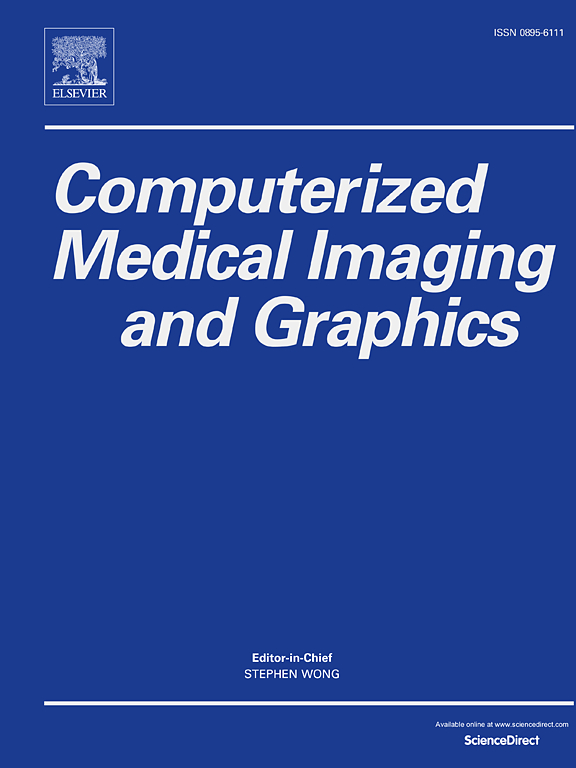Two-stage color fundus image registration via Keypoint Refinement and Confidence-Guided Estimation
IF 4.9
2区 医学
Q1 ENGINEERING, BIOMEDICAL
Computerized Medical Imaging and Graphics
Pub Date : 2025-04-19
DOI:10.1016/j.compmedimag.2025.102554
引用次数: 0
Abstract
Color fundus images are widely used for diagnosing diseases such as Glaucoma, Cataracts, and Diabetic Retinopathy. The registration of color fundus images is crucial for assessing changes in fundus appearance to determine disease progression. In this paper, a novel two-stage framework is proposed for conducting end-to-end color fundus image registration without requiring any training or annotation. In the first stage, a pre-trained SuperPoint and SuperGlue network are used to obtain matching pairs, which are then refined based on their slopes. In the second stage, Confidence-Guided Transformation Matrix Estimation (CGTME) is proposed to estimate the final perspective transformation matrix. Specifically, a variant of 4-point algorithm, namely CG 4-point algorithm, is designed to adjust the contribution of matched points in estimating the perspective transformation matrix based on the confidence of SuperGlue. Then, we select the matched points with high confidence for the final estimation of transformation matrix. Experimental results show that our proposed algorithm can improve the registration performance effectively.
基于关键点细化和置信度估计的两阶段彩色眼底图像配准
彩色眼底图像被广泛用于青光眼、白内障和糖尿病视网膜病变等疾病的诊断。眼底彩色图像的配准对于评估眼底外观变化以确定疾病进展至关重要。本文提出了一种新的两阶段框架,在不需要任何训练和注释的情况下进行端到端彩色眼底图像配准。在第一阶段,使用预训练的SuperPoint和SuperGlue网络获得匹配对,然后根据它们的斜率对其进行细化。在第二阶段,提出了基于置信度的变换矩阵估计(CGTME)来估计最终的透视变换矩阵。具体来说,设计了一种4点算法的变体,即CG 4点算法,基于SuperGlue的置信度,调整匹配点在估计透视变换矩阵中的贡献。然后,选择高置信度的匹配点进行变换矩阵的最终估计。实验结果表明,该算法能有效提高配准性能。
本文章由计算机程序翻译,如有差异,请以英文原文为准。
求助全文
约1分钟内获得全文
求助全文
来源期刊
CiteScore
10.70
自引率
3.50%
发文量
71
审稿时长
26 days
期刊介绍:
The purpose of the journal Computerized Medical Imaging and Graphics is to act as a source for the exchange of research results concerning algorithmic advances, development, and application of digital imaging in disease detection, diagnosis, intervention, prevention, precision medicine, and population health. Included in the journal will be articles on novel computerized imaging or visualization techniques, including artificial intelligence and machine learning, augmented reality for surgical planning and guidance, big biomedical data visualization, computer-aided diagnosis, computerized-robotic surgery, image-guided therapy, imaging scanning and reconstruction, mobile and tele-imaging, radiomics, and imaging integration and modeling with other information relevant to digital health. The types of biomedical imaging include: magnetic resonance, computed tomography, ultrasound, nuclear medicine, X-ray, microwave, optical and multi-photon microscopy, video and sensory imaging, and the convergence of biomedical images with other non-imaging datasets.

 求助内容:
求助内容: 应助结果提醒方式:
应助结果提醒方式:


